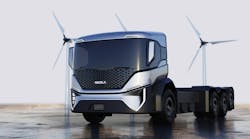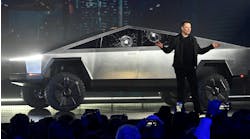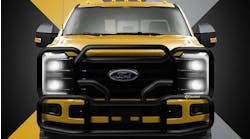It’s no surprise the electrification revolution would arrive in the refuse sector, as the battery-electric vehicles are much quieter, great for early morning residential routes, and the energy used to stop the trucks for each pickup can be recycled back to the battery through the regenerative braking system. The shock here is that upstart manufacturer Nikola, which won’t start production on any trucks until late 2020, has received an order from one of the biggest waste collection companies, Republic Services, for 2,500 of its Class 8 Nikola Refuse trucks. Based off the Nikola Tre model, these zero-emission vehicles will have a redesigned cab, with the waste collection body added at the factory as opposed to at an upfitter.
Testing will begin in 2022 in California and Arizona, with deliveries expected in 2023. These trucks will have a range of 150 miles and be able to scoop up 1,200 waste bins per charge, due to 720 kWh of energy storage on the battery.
The Tre will first be produced for Europe, rolling out of Nikola partner Iveco’s Ulm, Germany, plant by the end of 2020. The Class 8 truck was designed to have 2,000 HP, which will be software limited to 1,000 HP. Diesel and natural gas refuse trucks have a 300 to 500 HP range on average, which on steep grades gives the Tre a distinct performance advantage.
The Tre batteries are also submerged in dieletric fluid, helping them to cool or heat up the battery faster, ensuring they perform well in cold climates.
With states and municipalities adopting stricter zero-emission truck regulations, that’s another clear win for the battery-electric truck.
According to Republic Services, which has a fleet of 18,000 trucks and accounts for 20% of new sales in the refuse space annually, this marks the company’s biggest single order ever, about double any previous one. This is a binding contract, and if the Tre performs to expectations, Republic may buy another 2,500.
“When you have something like this, where you've got to do something truly new to the world, it takes a longer-term commitment,” said Jon Vander Ark, Republic Services president. “And we were very comfortable making it, because it reinforces our belief that this is where the space is going. This is what customers want. This is where all the economic incentives and regulation are pushing [the industry]. So, it was pretty easy for us to make the commitment.”
Nikola stands to make $1 billion off this initial deal, though a price per vehicle was not revealed. Each unit is expected to be under $500,000, the average cost of a diesel refuse truck.
The entire truck, comprising the chassis, powertrain and body, will be built at the currently under-construction Coolidge, Ariz., factory, with one warranty to cover everything. The body for the automated side loaders and front loaders will be licensed from an existing partner, which was not yet announced.
The body-chassis integration will allow Nikola to simplify manufacturing and “drive the cost down,” said Trevor Milton, Nikola founder and executive chairman.
“That's a humongous step,” said Milton of the all-encompassing factory warranty. “Anyone who's in the waste industry knows how big of a deal that is. It's the first time it's ever been done.”
Milton, who previously worked on product development for CNG refuse trucks, added “Whenever something went wrong, everyone would point fingers at each other.”
Now, Nikola stands to take all the blame or reap all the rewards. The announcement has certainly helped recently-public Nikola’s stock, which opened at $36.72 and jumped 22% to $44.81 at closing on Aug 10.
For Republic Services, this move isn’t exclusively about dollars and sense, though the battery-electric vehicles do offer fewer moving parts and promise better total cost of ownership, in large part to the life-extending regenerative brakes.
“We haven't gotten caught up in the details of all the economics,” Vander Ark said. “That's how innovation fails. We focused on how we jointly get this product to market together.”
These cleaner, quieter trucks should be easier to drive, good for customers and employees, and the value proposition is good for shareholders, Vander Ark said.
“Most importantly, I'm excited for my kids and my grandkids and hopefully my great-grandkids, because I think we're going to deliver a cleaner future,” Vander Ark asserted.
Republic has looked into electrification for “multiple years,” and in 2019 announced a partnership with Mack Trucks to pilot its LR Electric model. That plan is still ongoing.
The loser in all this appears to be CNG-fueled refuse trucks, which Vander Ark called “a bridge technology that served its purpose, but doesn't offer the zero emission future that electrification does.”




